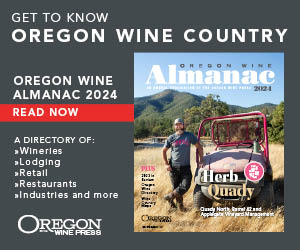Wineries Deal with Crush of Charity Requests
By Janet Eastman
Imagine a fundraising dinner without wine. No bubbly greeting guests at the entrance. No free-flowing bottles of Cab and Chardonnay to loosen up auction bidders. No toasting the victor of prestigious auction packages: Those walls of wine, instant cellars, winery feasts or reserved magnums paired with trips to the wine regions of France, Italy or Spain.
In other words: Dullsville.
“We couldn’t do it without wine,” said Nancy Saum Hough, who is collecting donations for Mobility Unlimited’s 9th Annual Jazz & Jewels auction dinner set for March 6 at the Rogue Valley Country Club in Medford. “Most of our supporters are wine drinkers of some caliber and we love the idea of being able to expose them to different wines. It’s a treat for us and a treat for them.”
Now imagine the winery owner who has to sort through hundreds of requests for donations every year, or month, or week, depending on the winery’s prominence on charity’s radar. It’s easy to give to employees and customers asking for their pet causes. But with Oregon’s growing national reputation, there is also an increase in the number of form letters, phone calls, e-mails, websites and Facebook requests from fundraisers all over the U.S.
Angela Bennett of Silvan Ridge Winery in Eugene offers a 50 percent discount to any Oregon nonprofit. But out-of-state yacht clubs and dental foundations contact her too. It’s no wonder some winery owners say they’re feeling overwhelmed and becoming a bit jaded.
Not only does it take time to figure out which group to support, the cost of giving is high: Most people who see wine at a fundraiser assume it’s a tax-deductible donation (it isn’t). Or "free" advertising that results in new customers (most of the time, it isn’t). Or a way for a winery to generously show its community support (it is). Considering the expense wineries take in giving, with very limited return, it almost seems as if we should be donating to them.
Marcus Goodfellow of Matello Winery might be speaking for many when he said with a sigh, “I'm a soft touch.” Dozens of Oregon wineries jumped in instantly to aid Haiti after the January earthquake. Several are pledging proceeds from specific wines to a chosen cause or are giving away a percentage of profits or tasting room fees. Many winemakers and growers have founded and funded nonprofits. They give generously to organizations such as iSalud!, which provides healthcare access to seasonal vineyard workers and their families. The Wisnovsky family of Valley View Winery in Jacksonville helped start the Hearts & Vines wine auction, which has raised $2 million for domestic violence prevention programs since 1993.
The Oregon Wine Board does not keep a tally on how much the industry donates in the form of money, merchandise, experiences and discounts each year. But in addition to all that uncountable giving, Eden Valley Orchards’ Anne Root said that wineries create environments in which organizations can raise money. Charity tasting events, food collection bins and donation jars are common in many tasting rooms. Root has also offered up the Voorhies Mansion and the landscaped gardens of her Medford property to worthy causes over the years.
Looking at it closely, it is hard to imagine a fundraising event without support in some form from a winery. But when is too much?
Dealing with the charity crush
“If we were in the business of giving away wine we would be outrageously successful,” said Laura Lotspeich of Trium Wines, which only produces 1,000 cases year.
She remembers when two volunteers came to her Talent tasting room on a Thursday afternoon and asked if she would pour wine a few days later for 300 people at a dinner to raise money for Africa. “Not tastes, but glasses of wine,” said Lotspeich. “They had no idea how much they were asking. For a small winery to pour over $1,000 worth of wine for an event may be all they can do for the year.”
How best, then, to handle the crush of donation requests?
Some wineries such as Willamette Valley Vineyards in Turner have formed committees to review requests. Others establish guidelines and post them on their websites that specify their choice of giving based on the organization’s location (preferably in their community or where their wine is sold), the people helped or the cost to operate. And sometimes, it’s just personal preference.
Robert Kerivan of Bridgeview Vineyard & Winery in Cave Junction was once too generous. Then he was audited by the Oregon Department of Revenue for wanting to write off $55,000 worth of donated wine. “I was told I couldn’t do that because I had already deducted the cost of growing the grapes, the vineyard wages, the bottles, corks and labels,” he said. His claim was denied.
Oregon Department of Revenue spokeswoman Rosemary Hardin explained: Since he deducted the cost of making the wine as a business expense, he couldn’t then deduct the wine again as a donation.
Now, Kerivan sells his wine to charities at half price and encourages them to auction it at full price or ask a donor to underwrite the expense. Sometimes, he just writes a personal check to show his support. But, like everyone, he has his limits.
“Everyone picks on wineries,” he said. “You never hear at an auction that someone’s bidding on a car rental or a root canal, do you?”
Charities give back
Of 350 Oregon wineries contacted for this story, none responding reported any benefits from making a donation, other than feeling good about it. It is rare that such gifting results in a wine club membership or a big purchase. The best that can happen is that the donation includes time at the tasting room, where it’s more likely to serve as an introduction.
Jill Zarnowitz of Stag Hollow Wines in Yamhill echoed many small producers’ concerns when she said it’s too easy to be a forgettable blur at a large event, unless a representative can be there to pour and talk about the wine. Recognition after the fact is nice, too: “We never hear back from non-local charities as to what our donation fetched them. Was it expensive wine, but went for cheap or vice versa?” she said.
Auction-organizer Hough understands. She said her small nonprofit group has been successful with its annual dinner auction because event volunteers are members of the wine clubs they solicit. Hough’s team makes personal calls, acknowledges the donations in the evening’s program and sends thank you letters. “We are asking wineries to help us, but in the same way, we want to help them,” said Hough, whose husband Bruce founded Mobility Unlimited, which helps physically disabled Oregonians get the equipment needed to work and live independently.
Typically, her volunteers ask for one bottle and a tasting certificate “to start their relationship as patrons,” she said. Often, they are given extra bottles, magnums or special vintages signed by the winemaker. For a Taste of the Region package, Hough said some of the Rogue Valley wineries weren’t in a position to donate a bottle but they sold it at a lower price.
And who knows what can happen with that kind of give and take?
Trudy Kramer of Kramer Vineyards in Gaston has become friends with some of the organizers who have received her two-bottle gift box over the years. “Sometimes they taste and purchase wine beyond the donation,” she added. “I have formed a nice relationship with them.”
Can you imagine charitable giving when all parties feel good?
Janet Eastman writes for national magazines and websites, including covering Southern Oregon wine for Examiner.com.







